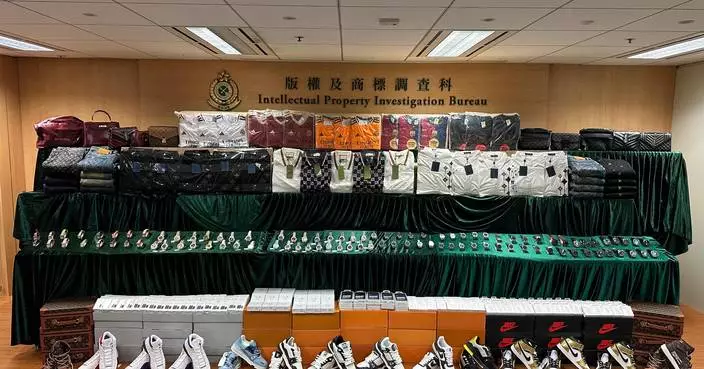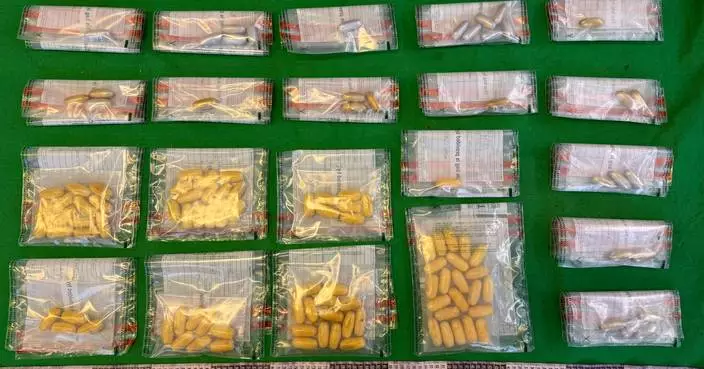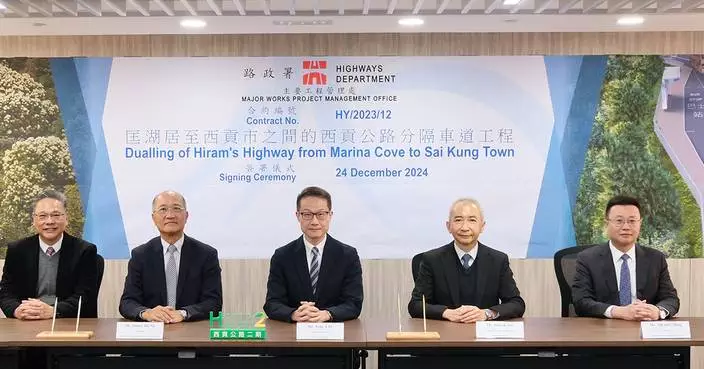CHP announces one new confirmed melioidosis infection case over past week
The Centre for Health Protection (CHP) of the Department of Health today (November 15) said that one new confirmed melioidosis infection case had been recorded in the past week (November 8 to 14).
The case involves an 80-year-old male with underlying illnesses who lives in Kwun Tong. He developed a fever and cough on October 30 and was admitted to United Christian Hospital from November 2 to 5. He was admitted to United Christian Hospital again on November 7 after his clinical samples were confirmed positive for Burkholderia pseudomallei upon testing. The patient is in stable condition.
The CHP is investigating the infection source of the case. Epidemiological investigations are ongoing. So far, 22 melioidosis infection cases have been recorded in Hong Kong this year. In 2023, 17 melioidosis infection cases were recorded.
A spokesman for the CHP reiterated that person-to-person transmission and animal-to-human transmission are rare, but melioidosis bacteria can survive in the local environment. Melioidosis is an endemic disease in Hong Kong and melioidosis cases have been recorded in Hong Kong each year. According to literature, infection cases are more common after typhoons or storms. The bacterium Burkholderia pseudomallei of melioidosis in soil and muddy water may become exposed to the ground after typhoons or storms, and the bacteria could spread more easily with strong winds or storms. As such, the number of melioidosis cases may increase.
The CHP reminded members of the public that melioidosis can be spread by contaminated soil and water during and after typhoons and storms. Where practicable, people should stay indoors during typhoons and storms, avoid travelling to areas with potential flooding, and do not wade in or have contact with muddy water and soil. In addition, high-risk individuals should avoid paths near stormwater drains where aerosols may be generated from contaminated water.
Members of the public should also take the following preventive measures against infection:
Avoid contact with contaminated soil;
Wear appropriate protective clothing or footwear when participating in activities with possible contact with soil or water, e.g. using gloves and wearing boots. High-risk individuals may also consider wearing a surgical mask;
Wash or shower after exposure to contaminated water or soil;
Always clean any wounds as soon as possible and cover any cuts or grazes with waterproof dressings;
Wash hands with liquid soap and water after handling soil or gardening;
Observe food hygiene and avoid drinking raw water; and
Travellers can contract the disease through outdoor water sports. Risk of infection can be minimised by avoiding exposure to water sources (such as rivers, ponds or lakes) that might be contaminated.
The CHP appealed to members of the public to seek medical advice if they develop symptoms, in particular people with diabetes or other immunocompromised conditions, in order to receive an appropriate medical diagnosis and treatment. For more information on melioidosis, please visit the website of the CHP atwww.chp.gov.hk/en/healthtopics/content/24/101110.html.
Second National Security Education Study Tour returns to Hong Kong after visiting Beijing and Shanghai
The second National Security Education Study Tour organised by the Hong Kong Special Administrative Region (HKSAR) Government concluded and returned to Hong Kong this afternoon (December 24). A total of 131 principals, teachers, and students from 19 primary and secondary schools in Hong Kong departed for Beijing on December 18. The primary school group completed their tour and returned to Hong Kong on December 22, while the secondary school group proceeded to Shanghai on the same day and returned today. Members of the study tour were primarily from the winning teams with outstanding performance and achievements, as well as their coaching principals and teachers of schools that excelled in the Territory-wide Inter-school National Security Knowledge Challenge, jointly organised by the Department of Justice, the Security Bureau, the Education Bureau, and the Hong Kong Shine Tak Foundation. Among the participants were non-Chinese speaking students joining both the challenge and study tour for the first time. The Secretary for Security, Mr Tang Ping-keung, the Secretary General of the Committee for Safeguarding National Security of the HKSAR, Mr Au Chi-kwong; and the Chairman of the Hong Kong Shine Tak Foundation, Mrs Tung Ng Ling-ling, accompanied the study tour to Beijing, while the Under Secretary for Education, Dr Sze Chun-fai, joined the study tour on December 21 in Beijing and travelled with them to Shanghai. On December 22, members of the study tour were warmly received by Deputy Director of the Hong Kong and Macao Work Office of the Central People's Government, Mr Nong Rong.
In the past few days, the study tour visited the Museum of the Communist Party of China and participated in interactive exchanges with teachers and students from the Branch of the High School Affiliated to Renmin University of China and Zhongguancun No. 3 Primary School. They also watched the solemn flag-raising ceremony on the viewing stage of Tiananmen Square. Other sites visited included the National Museum of China, the National Archives of Publications and Culture, the China Academy of Space Technology, the China Science and Technology Museum, the China National Arts and Crafts Museum, the Shanghai National Security Education Center, and the Sihang Warehouse Memorial of War of Resistance Against Japanese Aggression.
During the tour, students demonstrated great enthusiasm and curiosity about the country's system, history, culture, economy, science and technology, and social development. They eagerly embraced this opportunity to move beyond textbooks for on-site visits, particularly being deeply moved when watching the national flag rise on the viewing stage at Tiananmen Square. The visit to the China Academy of Space Technology enhanced their understanding and aspirations regarding the country's aerospace technology development. During their interactions at key primary and secondary schools in Beijing, they were also impressed by the diverse learning environment and the enthusiasm of local students.
Yang, a student from Ng Clan's Association Tai Pak Memorial School, remarked that the Museum of the Communist Party of China left the deepest impression on him, especially the history of the Long March. He felt both pained and moved by the pioneers' contributions and efforts in building New China. Lam, a student from Munsang College (Hong Kong Island), said that as Chinese people, everyone should unite, contribute together, and actively participate in the country's future development. She believes that their generation, blessed by the protection and guidance of their predecessors, also bears the responsibility of safeguarding national security. Kabra, a non-Chinese speaking student from Queen's College, said the tour broadened his understanding of China's history, culture, and national security. He emphasised that he returned to Hong Kong not only with knowledge but also a commitment to applying these insights to help build a more secure world.
The Secretary for Security, Mr Tang Ping-keung, encouraged students at the opening ceremony to understand the history and culture of the country through their footsteps, comprehend China's modernisation through their eyes, listen to the thoughts and voices of the Chinese people with their ears, and to grasp the essence of China's spirit with their hearts. He urged them to deeply appreciate the historical depth, cultural richness, and warmth of lives in the Motherland, develop positive viewpoints on state, history and nation, thus proactively safeguarding national security and better contributing to Hong Kong and the Motherland. Secretary General, Mr Au Chi-kwong, expressed his encouragement towards the students' enthusiasm for exploring national security knowledge, urging them to learn more about the country's history, culture, and achievements in various fields through on-site visits and to deepen their understanding of the principle of "one country, two systems", becoming proactive contributors to Hong Kong's future development. At the closing ceremony, the Under Secretary for Education, Dr Sze Chun-fai, encouraged students to share their experiences and insights from the study tour with their teachers and classmates. He emphasised the importance of combining reading extensively with traveling widely to deepen their understanding of the country's history, culture, and current realities. He encouraged them to maintain their enthusiasm for learning and to aspire to become pillars of society in the future.






